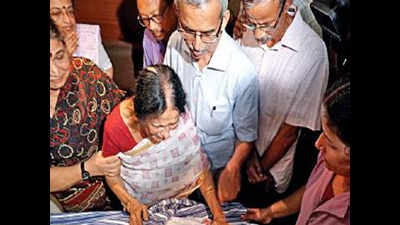- News
- City News
- kochi News
- Attoor Ravi Varma, poet and translator, dies at 88
Trending
This story is from July 27, 2019
Attoor Ravi Varma, poet and translator, dies at 88
Eminent Malayalam poet and translator Attoor Ravi Varma died at a private hospital here on Friday afternoon, following age-related ailments. He was 88. Attoor, as the departed writer is fondly called by his admirers and students, is survived by wife Sridevi, two sons Dr Noushad and Dr Praveen and daughter Reetha S Warrier.

Family members mourn Attoor Ravi Varma in Thrissur on Friday
THRISSUR: Eminent Malayalam poet and translator Attoor Ravi Varma died at a private hospital here on Friday afternoon, following age-related ailments. He was 88. Attoor, as the departed writer is fondly called by his admirers and students, is survived by wife Sridevi, two sons Dr Noushad and Dr Praveen and daughter Reetha S Warrier.
Attoor has won several awards, including Sahitya Akademi Award, Kerala Sahitya Akademi Award, Ezhuthachan Puraskaram, Aasan Memorial Award, Kunjiraman Nair Award and Premji Award.Recently, the Kerala Sahitya Akademi conferred its fellowship on Attoor.
Attoor has taught in the government colleges at Thalassery, Pattambi, Palakkad and Thrissur.
Attoor doesn’t leave behind a huge volume of work. He had written about 150-odd poems, which had been published as a book ‘Attoorinte Kavithakal’. Each of these poetries are powerful expressions of modernity even when remaining deeply rooted in the Indian cultural ethos, and more accurately in the Dravidian and native Kerala traditions. Most of his engagements with the national ethos were acutely critical also.
“Attoor had the rare capacity to go into the nuclear core of the contemporary complexities and express them in the most original expressions by discarding all pressures and lures of compromises. Each of Attoor’s poems were unique and were rebellions against all forms decadence,” Pillai said.
Writer C R Parameswaran said that Attoor never expressed anything that he himself had not experienced. “Through this, he may have missed many of the significant socio-cultural complexities and turbulences of the period he lived. But he was determined to be authentic and original,” Parameswaran said.
Writer and activist K Aravindakshan pointed out that Attoor’s works had exposed him to the human possibility of returning to the roots even after sojourns through multiple continents, cultures and layers of time.
A remarkable trait of Attoor was his ability to differentiate between what is desirable and discard the undesirable without any qualms.
Attoor was very close to Tamil literature and veteran cultural personality late M Govindan had played an important role in strengthening his reverence to the Dravidian culture. Attoor has translated the works of several renowned Tamil writers of the recent period like Sundara Ramaswamy (‘JJ Sila Kurippugal’, ‘Oru Pulimarathin Kathai’), S Nagarajan and Salma.
More recently Attoor had teamed up with writer Madhavan Ayyappath for translating ‘Kambha Ramayana’ from Tamil to Malayalam. Ayyapath said the translation of ‘Kambha Ramayana’, which is in eight volumes, with each containing about 1,500 slokas, is almost complete, and Mathrubhumi Books is publishing it.
Family sources said the last rites of Attoor would be performed after his son arrives from abroad.
Attoor has won several awards, including Sahitya Akademi Award, Kerala Sahitya Akademi Award, Ezhuthachan Puraskaram, Aasan Memorial Award, Kunjiraman Nair Award and Premji Award.Recently, the Kerala Sahitya Akademi conferred its fellowship on Attoor.
Attoor has taught in the government colleges at Thalassery, Pattambi, Palakkad and Thrissur.
Attoor doesn’t leave behind a huge volume of work. He had written about 150-odd poems, which had been published as a book ‘Attoorinte Kavithakal’. Each of these poetries are powerful expressions of modernity even when remaining deeply rooted in the Indian cultural ethos, and more accurately in the Dravidian and native Kerala traditions. Most of his engagements with the national ethos were acutely critical also.
“Attoor’s poetry has drawn immense energy and intense discipline from Kerala’s ‘Mela’ (percussion) culture. Even while remaining a modern poet, Attoor was very particular about adhering to the rigorous discipline of classical traditions,” recalls noted poet K G Sankara Pillai.
“Attoor had the rare capacity to go into the nuclear core of the contemporary complexities and express them in the most original expressions by discarding all pressures and lures of compromises. Each of Attoor’s poems were unique and were rebellions against all forms decadence,” Pillai said.
Writer C R Parameswaran said that Attoor never expressed anything that he himself had not experienced. “Through this, he may have missed many of the significant socio-cultural complexities and turbulences of the period he lived. But he was determined to be authentic and original,” Parameswaran said.
Writer and activist K Aravindakshan pointed out that Attoor’s works had exposed him to the human possibility of returning to the roots even after sojourns through multiple continents, cultures and layers of time.
A remarkable trait of Attoor was his ability to differentiate between what is desirable and discard the undesirable without any qualms.
Attoor was very close to Tamil literature and veteran cultural personality late M Govindan had played an important role in strengthening his reverence to the Dravidian culture. Attoor has translated the works of several renowned Tamil writers of the recent period like Sundara Ramaswamy (‘JJ Sila Kurippugal’, ‘Oru Pulimarathin Kathai’), S Nagarajan and Salma.
More recently Attoor had teamed up with writer Madhavan Ayyappath for translating ‘Kambha Ramayana’ from Tamil to Malayalam. Ayyapath said the translation of ‘Kambha Ramayana’, which is in eight volumes, with each containing about 1,500 slokas, is almost complete, and Mathrubhumi Books is publishing it.
Family sources said the last rites of Attoor would be performed after his son arrives from abroad.
End of Article
FOLLOW US ON SOCIAL MEDIA










